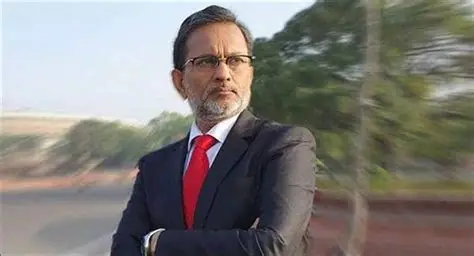
Ajit Anjum’s Explosive Video on SIR Malpractices attracts FIR
Ajit Anjum, a senior journalist and YouTuber, has been extensively reporting on alleged irregularities in the Special Intensive Revision (SIR) of electoral rolls in Bihar, a process initiated by the Election Commission of India (ECI) to update voter lists ahead of the 2025 state assembly elections. His coverage, primarily through his YouTube channel with 7.5 million subscribers, has sparked significant controversy, leading to an FIR filed against him on July 13, 2025, in Begusarai, Bihar.
Key Points of Ajit Anjum’s Disclosures:
-
- Alleged Irregularities in SIR:
Ajit Anjum’s YouTube videos, particularly one posted on July 12, 2025, highlighted discrepancies in the SIR process in the Sahebpur Kamal assembly constituency, Begusarai. He claimed that voter forms were being filled and uploaded without required documents or photographs, and some forms lacked signatures or were incomplete.
He reported systemic issues, such as Booth Level Officers (BLOs) being pressured to meet targets, leading to violations of ECI guidelines. For instance, voters were allegedly denied acknowledgment receipts, and BLOs were provided with only single copies of forms, forcing citizens to photocopy documents themselves.
Ajit Anjum’s videos suggested that these flaws could potentially disenfranchise voters, particularly in rural areas, due to inadequate verification protocols.
- Alleged Irregularities in SIR:
-
- Specific Incident in Balia:
On July 12, 2025, Ajit Anjum and his team visited a polling booth in Balia, Begusarai, where he questioned a BLO, Mohammed Ansarul Haque, about the voter revision process. He asked about the number of voters, form distribution, and specifically the number of Muslim voters, which later became a point of contention.
Anjum’s video allegedly showed sensitive documents and raised concerns about the transparency of the SIR process, prompting accusations from the administration that he was spreading misinformation and inciting communal tensions.
- Specific Incident in Balia:
-
- FIR and Accusations:
An FIR was lodged against Youtuber and journalist Ajit Anjum and his associates on July 13, 2025, at Balia police station, based on a complaint by BLO Mohammed Ansarul Haque. The FIR accused Anjum of obstructing government work, spreading communal discord, and violating ECI guidelines by filming without authorization. It cited sections of the Bharatiya Nyaya Sanhita (BNS) 2023 (223, 329(c), 132, 196, 302, 3(5)) and Section 123(3A) of the Representation of People’s Act, 1951.
The BLO alleged that Anjum’s questions focused on Muslim voters being harassed, which Haque claimed was false, and that Anjum’s team disrupted his work for an hour.
The Begusarai district administration issued a press release on July 13, 2025, dismissing Anjum’s claims as “baseless” and “misleading,” arguing that the SIR process was transparent and that Anjum’s video could incite public sentiment.
- FIR and Accusations:
-
- Anjum’s Defense:
Anjum denied the allegations, asserting that his reporting was factual and aimed at exposing systemic flaws in the SIR process. He claimed the FIR was an attempt to intimidate journalists and vowed to continue his reporting, even stating he would fight the case up to the Supreme Court if necessary.
On X (twitter), Anjum posted that he had not received a copy of the FIR initially and accused the administration of using a Muslim BLO as a “pawn” to target him. He challenged the ECI to fact-check his reports and prove them wrong.
He emphasized that his journalism was fair and unbiased, and his videos did not reveal voter identities or close shots of sensitive documents.
- Anjum’s Defense:
-
- Support and Condemnation:
Several press bodies, including the Press Club of India, Indian Women’s Press Corps, Digipub News India Foundation, Delhi Union of Journalists (DUJ), and Editors Guild, condemned the FIR as an attack on press freedom. They argued that Anjum’s reporting was a legitimate journalistic exercise and demanded the FIR’s withdrawal.
Political leaders like Congress’s Srinivas BV and Pappu Yadav supported Anjum, criticizing the ECI and calling the FIR a “badge of honor” for his journalism.
- Support and Condemnation:
Conversely, the ECI and Patna district administration refuted Anjum’s claims, with the ECI fact-checking opposition leaders like Rahul Gandhi and Tejashwi Yadav for amplifying his video. The ECI stated that the SIR process was transparent, with 83.66% of enumeration forms collected by July 14, 2025.
-
- Context of SIR in Bihar:
The SIR, announced by the ECI on June 24, 2025, aims to sanitize voter lists by registering eligible voters, removing ineligible ones (e.g., due to migration, fatalities, or illegal immigration), and ensuring transparency before the November 2025 elections. This is the first such intensive revision in Bihar since 2003.
The process has faced criticism from opposition parties and activists for being rushed and potentially discriminatory, with 2.9 crore out of 7.8 crore voters (37%) required to submit documentary proof of eligibility.
- Context of SIR in Bihar:
Anjum’s reporting highlighted practical challenges, such as the lack of birth certificates, caste certificates, or property documents among many Bihar residents, complicating voter verification.
Critical Perspective:
While Anjum’s reporting has brought attention to potential flaws in the SIR process, the accusations against him—particularly regarding communal incitement—stem from his focus on Muslim voters, which the administration claims was misleading. The ECI and Begusarai administration maintain that the SIR is transparent, and Anjum’s video was dismissed as false by official statements. However, the FIR and administrative pressure raise concerns about press freedom, as noted by multiple press bodies. The controversy reflects a broader tension between journalistic scrutiny and administrative control, especially in a politically charged pre-election environment. The opposition’s amplification of Anjum’s claims, countered by the ECI’s fact-checking, suggests a polarized narrative, with truth likely lying in a nuanced middle ground—some procedural lapses may exist, but allegations of widespread fraud or communal bias require further substantiation.